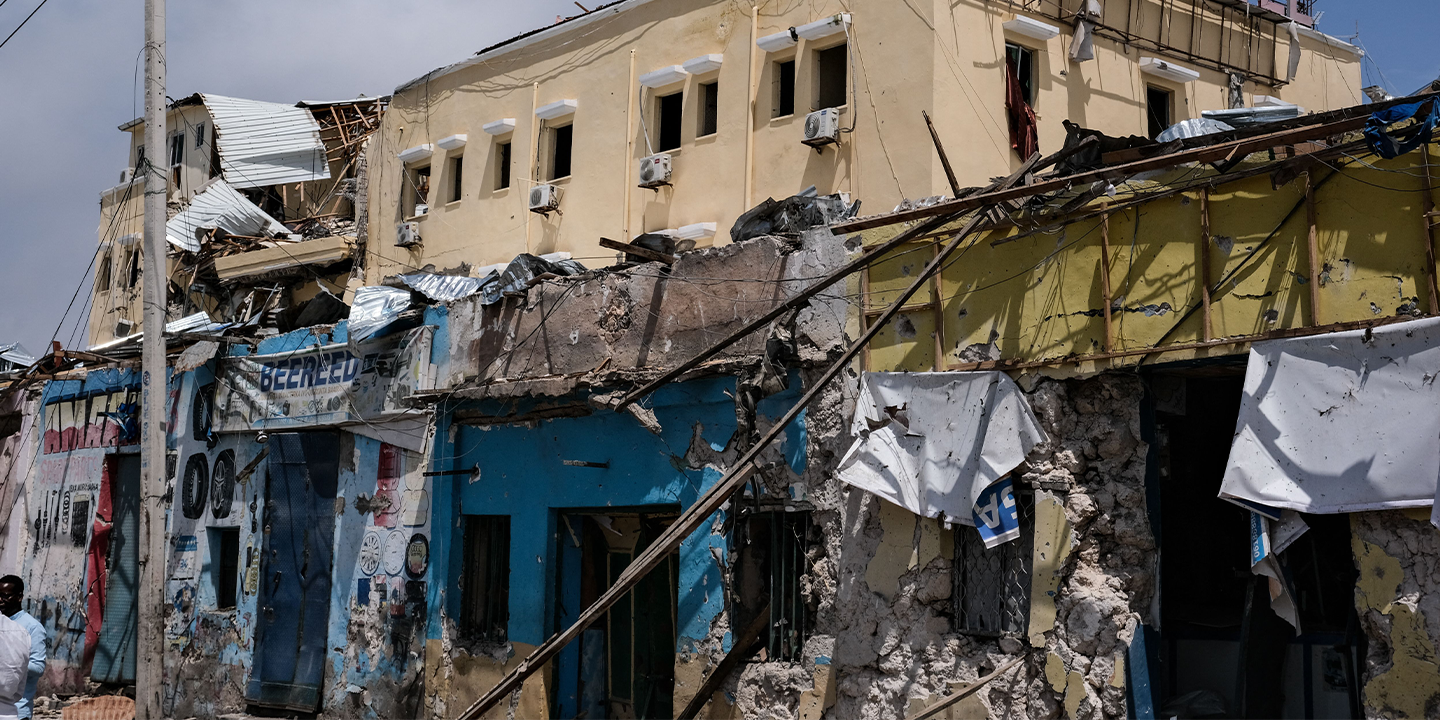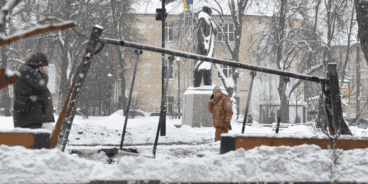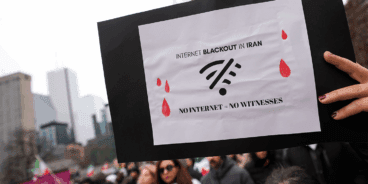

Atrocity Alert No. 324: Somalia, Ukraine and Justice for Past Atrocities
Atrocity Alert is a weekly publication by the Global Centre for the Responsibility to Protect highlighting situations where populations are at risk of, or are enduring, mass atrocity crimes.
TWIN BOMBINGS IN MOGADISHU, SOMALIA KILL 121
On Saturday, 29 October, a car bomb exploded near the busy Zobe intersection in Somalia’s capital of Mogadishu. A second explosion occurred as first responders were arriving to aid the victims of the initial bombing, and gunfire was subsequently reported at the nearby Ministry of Education building. The armed extremist group Al-Shabaab has claimed responsibility for the attack, which killed at least 121 people and wounded over 300. Sadik Dudishe, spokesperson of the Somali Police Force, said, “The ruthless terrorists killed mothers. Some of them died with their children trapped on their backs.” The incident on Saturday was the second major attack on the Zobe intersection in the last five years. In October 2017 a truck bomb exploded, killing almost 600 people and injuring hundreds of others in the deadliest attack of its kind in Somalia’s history.
In recent months Al-Shabaab has increasingly targeted and attacked civilians and civilian infrastructure in apparent reprisal for offensives by Somali and international forces. The UN documented 428 civilian casualties between February and May 2022, with 76 percent of the casualties caused by indiscriminate attacks by Al-Shabaab alone. Since late August Al-Shabaab has perpetrated several attacks in populated areas in Mogadishu and Hiiraan province that have killed and injured scores of civilians, including women, children and humanitarian aid workers. Targeted attacks on civilians, civilian infrastructure and humanitarian aid workers are prohibited under international law and may amount to war crimes and crimes against humanity.
Somali and international forces have engaged in a decades-long conflict with Al-Shabaab, during which all parties have committed likely atrocity crimes. Political instability has continued to plague state-building efforts in Somalia, including initiatives aimed at cohesively combatting Al-Shabaab and other armed groups, exacerbating the volatile security environment.
Meanwhile, civilians continue to be severely impacted by a historic drought, threatening almost 8 million Somalis – nearly half of the country’s population – with increasing food and resource needs. The UN has warned that almost 1 million people in need are in areas under Al-Shabaab control and inaccessible to aid workers. The drought has also displaced over 1.1 million people, placing them at further risk of violence and exploitation by Al-Shabaab and other armed groups.
The Global Centre for the Responsibility to Protect’s Somalia Expert, Sarah Hunter, said, “For decades, Somalia’s population has been preyed upon by armed groups and left vulnerable to attack. The international community must continue to support capacity building for human rights and governance, as well as provide humanitarian aid to help address the complex security and humanitarian needs facing populations. Sustainable peace is essential to prevent further war crimes and crimes against humanity.”
RUSSIA CONTINUES STRIKES ON UKRAINIAN CITIES AND THREATENS TO LEAVE GRAIN DEAL
On 31 October Russia launched a new series of missile attacks across urban centers in at least ten regions of Ukraine. The strikes caused civilian casualties and damaged at least 18 energy-related facilities. Damage to one power plant left 80 percent of Ukraine’s capital, Kyiv, without water and approximately 350,000 apartments without electricity. Residents in other cities, including Ukraine’s second largest city of Kharkiv, reported power and water outages due to strikes on electric and hydropower stations. With an estimated 40 percent of Ukraine’s energy infrastructure damaged by the conflict, the World Health Organization has warned that the lack of access to energy could be a matter of life and death during the upcoming winter months. Targeted attacks on civilian infrastructure are prohibited under International Humanitarian Law (IHL) and may amount to war crimes.
After issuing evacuation orders and offering monetary incentives for civilians along the western bank of the Dnipro River to leave in October, on 31 October Russian officials further expanded the order to include a nine mile area along the river’s eastern bank in areas of Russian-occupied Kherson region. The call comes amidst an advance on the region by Ukrainian forces. Ukrainian government officials have said civilians are being evicted from their homes and alleged that the evacuations constitute forced deportations from occupied territory, which may amount to a war crime.
Meanwhile, prior to today’s announcement by Russian authorities to resume participation in the Black Sea Grain Initiative, the prospects of the much-needed initiative had hung in balance. Days earlier, on 28 October, Russian authorities said they were suspending participation due a drone attack on their Black Sea fleet in the occupied-Crimean port city of Sevastopol. Brokered by the UN and Türkiye in July, the initiative had allowed for the resumption of grain and fertilizer shipments through an agreed-upon corridor in the Black Sea following a months-long blockade.
According to the UN Under-Secretary-General for Humanitarian Affairs and Emergency Relief Coordinator, Martin Griffiths, “thirty-eight countries have purchased some nine million tons of grain from Ukraine under the Black Sea Grain Initiative.” The blockade of shipments from Russia and Ukraine – which supplies nearly 30 percent of the world’s exported wheat and barley, as well as other cooking oils and fertilizer – severely impacts global food prices and has had a particularly devastating impact on efforts to deliver aid to the most vulnerable communities around the world.
Executive Director of the Global Centre for the Responsibility to Protect, Savita Pawnday, said, “Ensuring the continuation of the Black Sea Grain Initiative is essential to protecting the global food and humanitarian aid supply. While we urge Russia to fulfill its assurances that it will resume participation in the initiative, we also call on Russian authorities to cease the cruel bombing of civilian infrastructure in Ukraine and to uphold standards of IHL.”
JUSTICE FOR PAST ATROCITIES IN KENYA AND CENTRAL AFRICAN REPUBLIC
The pursuit of justice and accountability is critical to deterring future atrocities and preventing recurrence, as well as for ensuring victims’ rights to justice and reparation. In recent days there have been landmark advances towards accountability and the fight against impunity for past atrocities in Kenya and the Central African Republic (CAR).
On Friday, 28 October, Kenyan prosecutors decided to charge 12 police officers with crimes against humanity, including murder, rape and torture, in the context of the violent crackdown following the disputed presidential election in August 2017. The aftermath of the elections was characterized by grave human rights violations perpetrated against protesters, including unlawful killings, beatings and abuses by police officers, as well as house-to-house searches. Over a four-month period, the Kenya National Commission on Human Rights documented 94 deaths and 201 cases of sexual violence.
This is the first case that will utilize Kenya’s “International Crimes Act” to prosecute crimes against humanity in Kenyan courts, as well as the first criminal prosecution of election-related sexual violence. UN High Commissioner for Human Rights, Volker Türk, stated that, “Today’s groundbreaking decision is a positive step towards justice and accountability for survivors and families of victims, including in the context of electoral violence, and can strengthen prevention of future violations.”
Meanwhile, on Monday, 31 October, the Special Criminal Court (SCC) in CAR issued its first verdict, finding three suspected members of the “3R” (Retour, Réclamation et Réhabilitation) armed group – Issa Sallet Adoum, Ousman Yaouba and Tahir Mahamat – guilty of crimes against humanity and war crimes, including murder and other inhumane acts. The crimes were committed in May 2019 in the villages of Koundjili and Lemouna, Ouham-Pendé prefecture, where inhabitants were tied up and at least 46 civilians extrajudicially killed.
CAR has a history of political instability and widespread impunity that has fueled cycles of armed conflicts and atrocities. A hybrid judicial mechanism, the SCC was established in 2015 to try international crimes committed during conflicts in the country since 2003. Christine Caldera, CAR expert at the Global Centre for the Responsibility to Protect, said, “The historic verdict represents an important step in advancing justice domestically for victims and survivors of atrocities, as well as sends a strong message to perpetrators that justice will eventually catch up.” Impunity for past crimes has enabled 3R – one of the most powerful armed groups in CAR – to continue to perpetrate abuses against populations.
States are obligated under international law to effectively investigate and prosecute serious violations of international human rights and humanitarian law. The inclusion of international crimes in domestic legislation, such as through the International Crimes Act in Kenya, as well as the establishment of hybrid judicial mechanisms, such as the SCC, serve as important models for pursuing accountability for international crimes and ensuring that victims and survivors receive the recognition and justice that they deserve.
Related Content


Atrocity Alert No. 466: Ukraine, Syria and Crimes Against Humanity Treaty
